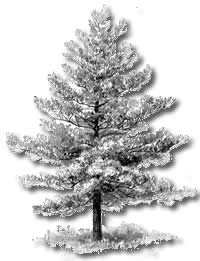New Hampshire Mast Trade |
|||||
 The white pine tree (Pinus strobus) was especially important in Colonial New Hampshire. These tall trees were perfect for the masts of sailing ships. Every winter representatives of the King of England would mark white pines trees with a mark called the "King's Broad Arrow." The colonists were not allowed to cut down these trees for their own use; they were reserved for the crown. Trees marked with the arrow were cut down, hauled down to a nearby river, and then floated to the sea where they would eventually be made into masts for the Royal Navy. The white pine tree (Pinus strobus) was especially important in Colonial New Hampshire. These tall trees were perfect for the masts of sailing ships. Every winter representatives of the King of England would mark white pines trees with a mark called the "King's Broad Arrow." The colonists were not allowed to cut down these trees for their own use; they were reserved for the crown. Trees marked with the arrow were cut down, hauled down to a nearby river, and then floated to the sea where they would eventually be made into masts for the Royal Navy. Need for Lumber
England depended on the Colonies for its lumber because it had no large forests of its own. England's forests had been cut down and made into farmland. Traditionally, England got Scotch fir (Pinus sylvestris) from Russia, Sweden, and other countries across the Baltic sea, but access to these countries could be cut off by its enemies, and the wood of the Scotch fir wasn't as strong as the wood of the white pine. One of the things England looked to the Colonies for was a steady supply of lumber to build ships for the Royal Navy. | Written in the Charter
The preservation of trees for the mast trade was so important to England that it was even written into the Massachusetts Bay Charter of 1691. (New Hampshire was annexed by Massachusetts between 1641 and 1643. It was proclaimed a royal colony in 1679, but even though they were separate colonies, the crown appointed a single man to govern both colonies until 1741, when Benning Wentworth was made the first Governor of New Hampshire.)
|
||||
